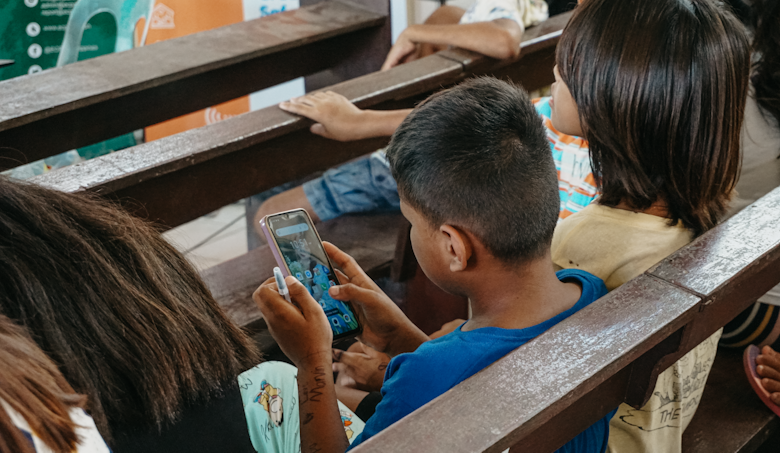HOW SAFE ARE FILIPINO CHILDREN ONLINE THIS SAFER INTERNET MONTH 2024?
This Safer Internet Month, our team in the Philippines has penned an opinion article on the situation of online child sexual exploitation in the Philippines along with tips to be safe online.
Situation in the Philippines
The continuing observance of Safer Internet Month, necessitates us to initiate conversations to shed light on the situation of children online. In the Philippines, children’s time online has increased significantly since the onset of the COVID-19 pandemic. The internet has enabled children and young people to continue learning amid the absence of face-to-face classes. This created opportunities for children and young people to communicate, socialise and play, and allowed them access to new ideas and more diverse sources of information. However, while the digital environment has become increasingly important to most aspects of children’s lives, and has afforded new opportunities for the realisation of their rights, it also facilitated a new set of risks to children’s safety and well-being, including their increased exposure and vulnerability to abuse and exploitation. The Disrupting Harm in the Philippines report estimated that at least two million children in the country were subjected to online sexual abuse and exploitation in 2021 alone. This includes being blackmailed to engage in sexual activities, someone sharing their sexual images without permission, or being coerced to engage in sexual activities through promises of money or gifts. Children and young people with diverse sexual orientation, gender identity, gender expression, and sexual characteristics (SOGIESC) face even more unique challenges when it comes to online safety. Studies highlight that bullying, harassment, and trolling are among the top challenges impacting LGBTQIA+ children and young people online.
Despite the Philippines’ relatively advanced laws on child protection, challenges remain in terms of translating these laws into actual programs and services at the community level. The lack of comprehensive child protection policies, gender-sensitive and inclusive child protection mechanisms and modules (e.g. current limitations of the national sexuality education modules and the Child Protection Committee (CPC) e-learning course for schools), uncoordinated programmes and services offered at the national and local levels, gaps in the Philippine criminal justice system, and limited investment coming from the national and local governments make it difficult to sustainably address the complex issue of online sexual abuse and exploitation of children (OSAEC). Inadequate social protection mechanisms and low access to basic social services also limit families and communities’ capacity to protect children online and offline. To respond to this, Terre des Hommes Netherlands in the Philippines has been collaborating tirelessly with different national and local stakeholders, including children and young people, to raise awareness, build the capacity of government agencies and service providers, lobby for relevant laws and policies, and complement government services for children who are victims and are at risk of online sexual exploitation.
“Proactively creating opportunities to enable children, including those with diverse SOGIESC and those with disabilities, to raise their voices and engage duty-bearers and decision-makers is crucial in order for meaningful change to happen,” stressed by Sunshine Kristia Cupo, Programme Manager of Terre des Hommes Netherlands in the Philippines
“Given the high concentration of OSAEC in the Philippines, actions that support the national and local governments in developing and implementing comprehensive policies and strengthening existing child protection mechanisms to protect children from OSAEC and increase their access to available, inclusive, and appropriate services, is necessary. Terre des Hommes Netherlands, with our partners, is committed to carrying out these actions and in amplifying our efforts at the national level to contribute to positive systemic change,” added by Eva Maria Cayanan, Country Director of Terre des Hommes Netherlands in the Philippines.
Tips from our Philippines Country Team
For children and young people navigating the digital landscape, here are some tips from Terre des Hommes Netherlands’ Philippine Country Office on how to keep yourself safe online:
A - Advocate and Speak out! Whenever you experience something confusing or upsetting online, reach out to an adult you trust to seek guidance. We encourage you also to raise or report any content or experience online which you deem as harmful or may put a child in danger.
B - Be cautious of suspicious or unfamiliar links: Be mindful and critical of the information that you post or share online. Find time to validate the legitimacy of the source before clicking or forwarding a link to another to avoid potential breach of personal information or being hacked.
C - Check your privacy: Use unique passwords for your social media accounts and do not share them with anyone. Review your privacy settings and keep your profile private. It is best that you avoid sharing any of your personal details with other people including your contact information, home address, location, and financial information. Do report cases of hacking immediately.
D - Do not share or repost personal information: Refrain from disseminating your personal information, and of others, including screenshots of their private posts, comments, reactions and/or messenger conversations. We must always strive to protect the privacy of everyone online.
E - Educate yourself: Equip yourself with knowledge on online safety and what you can do to keep the internet a safe space for everyone.
Terre des Hommes Netherlands is committed to empowering children and communities, and in addressing the online sexual abuse and exploitation of children in the Philippines through a systems strengthening approach that prominently highlights intersectionality and the significance of poverty reduction and social protection in combating child exploitation.

